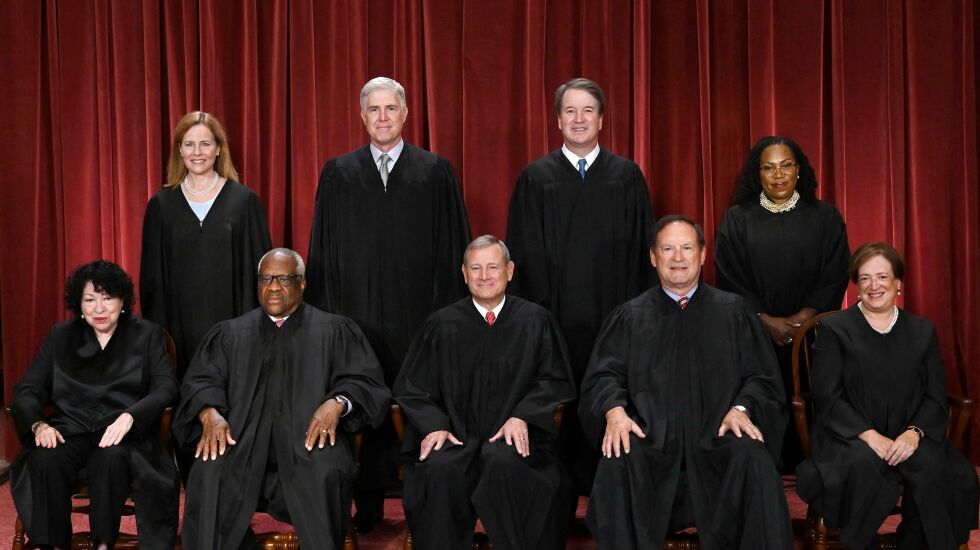
Public trust in the Supreme Court is in sharp decline. Gallup reports poll numbers that are the lowest in more than a decade. A new partisan divide has also emerged. Unlike in previous moments of public distrust, Democrats and Republicans depart dramatically in their views on the court.
The reasons for these troubling trends aren’t obscure. From abortion to guns to climate change and student debt, the court under Chief Justice John G. Roberts Jr. consistently delivers policy outcomes that the Republican Party espouses but can’t secure via elective bodies. At the same time, Justices Clarence Thomas, Samuel Alito, and Neil Gorsuch have been dogged by a drip-feed of revelations regarding dubious financial dealings with the wealthy. The latter are often interested in the justices for ideological or fiscal reasons, not because judges have especially sparking dinner-party repartee.
But durable fixes for the court’s partisan tilt are hard to imagine. The White House sapped political energy for term limits or court expansion in 2021 by kicking the issue to a cumbersome commission that released a report steering clear of taking a stand on sweeping reform.
Paradoxically, by easing political pressure on the court, President Joe Biden may well have doomed his own initiatives on climate change and student loan relief.
As a result, the most plausible short-term action to address the court’s shortfalls takes the form of ethics reform targeting one-off interactions between the justices and interested parties. Among the many bills introduced in D.C. are some with bipartisan backing. While headwinds remain, it’s not impossible to imagine one of these being enacted into law.
But even if ethics reform passes, it would do little to address the deeper malaise around the court. Such reform may well be a distraction from the more profound reasons for declining public confidence.
Conservative network shapes court decisions
The judicial decisions that sap public trust do not arise from the sort of one-off transactions at which ethics reform is aimed. Rather, today’s judicial majority is embedded in a strong social network of conservative advocacy groups, lawyers, law clerks, and politicians. This manifests, perhaps most clearly, in the judicial nomination process. Of former President Donald Trump’s appointments to the federal bench, approximately 90% were members of a single organization: the Federalist Society. Many judges affiliated with the Federalist Society defend their participation by claiming it is not “political.” But its tight nexus to the Republican transformation of the judiciary belies such protests.
The tight social networks on the conservative side of the court are also illustrated by where the justices choose to speak, and what they say. Justice Alito gives barn-busting speeches claiming the mantle of the religious culture warrior. He, Justice Gorsuch, and Justice Brett M. Kavanaugh all speak routinely at the Federalist Society. More recently, Justice Amy Coney Barrett chose to appear alongside former Senate Majority Leader Mitch McConnell at McConnell’s own center at the University of Louisville.
Conservative justices frankly acknowledge their dependence on these networks: The first time Justice Kavanaugh appeared at a Federalist Society dinner after his confirmation, he offered his “gratitude” for the organization’s support during his tempestuous confirmation process.
These social networks do not just allow for repeated interactions with partisan figures and organization. They shape case outcomes. There are notable occasions in recent years in which a fringe idea within the conservative legal movement traveled with impressive velocity from the margins to the pages of the Supreme Court’s reports.
One such instance can be observed as early as 2012. In the first constitutional challenge to the Affordable Care Act, the conservative majority resolved this question by asking whether Congress has the power to regulate commercial “inactivity” as well as “activity.” This was not an idea to be found in case law, or even in Founding Fathers-era texts. It was the brainchild of a sharp conservative legal scholar and libertarian bloggers, all widely read among legal elites on the right.
Networks also buffer the justices from public criticism. Insulated in a cocoon of the like-minded, justices are unlikely to self-regulate of their own volition.
In this context, one-off ethics scandals have the odd virtue of crystallizing a complex situation into easily digestible news stories: They refract larger structural problems into readily-grasped narrative nuggets. For this reason, calls for further ethics reform miss the mark by failing to grasp how the law is warped.
Even if limits on judicial affiliation with influential networks were legally permissible — and they are almost certainly not constitutional — they have no chance of being enacted in our polarized climate.
We are stuck, in short, with a bench that is selectively responsive to the arguments and interests of only some Americans, and unlikely to inspire broad public trust and confidence. Indeed, there’s no good reason for thinking it should.
Aziz Huq is the Frank and Bernice J. Greenberg Professor of Law at the University of Chicago Law School. His most recent book is “The Collapse of Constitutional Remedies.”
To submit a letter to the editor or op-ed, check out our guidelines.
The views and opinions expressed by contributors are their own and do not necessarily reflect those of the Chicago Sun-Times or any of its affiliates.







